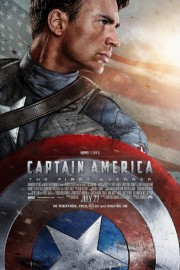Captain America: The First Avenger
With the release of Joe Johnston’s “Captain America,” the final pieces of the puzzle are in place for Marvel to assemble their “Avengers” next summer. Earlier this summer, we met Thor, the Godly son of Asgard as he learned humility and became deserving of his powers, and now, we see the origins of Steve Rogers, the 90-pound weakly who was recruited for the army’s supersoldier project by the German scientist Abraham Erskine (Stanley Tucci), who admired Rogers’s heart and determination. Rogers wants to head for the front lines of WWII along with his friend, James “Buck” Barnes (Sebastian Stan), but he gets stuck being a propaganda tool for the government until his courage leads him into the fray to help his comrades in arms.
As a director, Joe Johnston lacks the genius of Spielberg and the artistic ambition of Zemeckis, the two filmmakers I would equate him most with in terms of style and sensibility. A former effects guru at Industrial Light and Magic, where his work on the original “Star Wars” paved the way for modern blockbuster cinema, Johnston’s work lacks a distinctive trademark, but is almost always entertaining, be it the family comedy “Honey, I Shrunk the Kids!,” “Jumanji,” last year’s “The Wolfman,” or even the less-than-stellar “Jurassic Park III.” Johnston’s strongest films, however, have blended adventure and nostalgia for period in ways that are entertaining and unforgettable. Those films are his first foray into comic book action, 1991’s underrated “The Rocketeer,” as well as his inspiring 1999 drama, “October Sky.”
“Captain America: The First Avenger” belongs in the conversation with the latter two. It lacks the tight pacing and rapid fire wit of the “Iron Man” films in the Marvel ‘Verse, but excels at the sort of old-school action and character work that highlights not only Johnston’s best work, but also the Spielberg-directed adventures that come most to mind while watching “Captain America,” namely, “Raiders of the Lost Ark.” The comparisons are practically unavoidable: the German Army, and in particular the ruthless head of a top secret Nazi science division known as Hydra, get their hands on a mystical artifact of limitless power (if you stayed ’til the end of “Thor’s” credits, you’ve already seen it) that will make the Nazi’s invincible. Hydra’s leader, Johann Schmidt (Hugo Weaving in full villain mode), is very much like the Nazis in both “Raiders” and “Last Crusade” in his ambitious drive for a power that will not only turn the tide of war, but also fulfill Hitler’s dream of a 1000-year Reich. After an early experiment with Erskine’s supersoldier serum, however, Schmidt’s ambitions have turned to madness as he is transformed into the wicked Red Skull. As Erskine explains it to Rogers before he goes under the needle, the serum not only enhances an individual’s physical features, but also responds to the subject’s emotional core. For Schmidt, it amplified his aggression and monstrous ideals; in Rogers, Erskine hopes it will feed off of his determination and desire to do right. Once again, we are dealing with that age-old archetype of not just comic books but any good vs. evil story– the idea of hero and villain as two sides of the same coin, a notion that “Captain America” thrives on more than most comic adaptations.
As Rogers, Chris Evans finally finds the role that should shoot him to full-blown stardom after his Human Torch in another Marvel franchise, Fox’s childish “Fantastic Four” films, proved a non-starter. Though CGI and rigorous training makes for Rogers’s startling physical transition, it’s Evans who embodies the ideals Rogers is meant to stand for– American ingenuity, courage, and love of country and loyalty to the man next to you on the battlefield. Those are the values that led Erskine, movingly played by Tucci, to choose Rogers from the other, stronger potential supersoldiers under the command of Col. Chester Phillips (Tommy Lee Jones in a typically gruff and sarcastic performance). You can see the frustration in Rogers’s face when, after he chases down a German agent who tries to steal the serum for Hydra, he is used as a propaganda tool to sell war bonds rather than the soldier and leader Rogers longs to be. That’s all Evans, who dials the pretty-boy smug and comic rambunctiousness of earlier performances (not just in the “Four” films but also smaller roles in “Scott Pilgrim vs. the World” and the criminally underseen “The Losers”) down to just the right levels to play this all-American hero. Sure, he develops a crush on British agent Peggy Carter (a sharp witted and wonderful Hayley Atwell), but when you’re able to single-handedly rescue 400 Allied troops from a secure Hydra base, you’re entitled to your choice of woman to have that first dance with.
“Captain America” isn’t quite an adventure classic, however, and among the pre-“Avengers” Marvel films, it still sits behind “Iron Man” and “Thor.” At just over two hours, it runs a bit long, but considering the running time includes bookend sequences where the Captain is discovered in the arctic circle after 70 years by S.H.I.E.L.D. and agents of Samuel L. Jackson’s Nick Fury, who are ready to restore him to active duty along with Iron Man, Thor, and Hulk when the world needs saving, I’m prepared to overlook such an indulgence, especially when everything else works this well. Johnston has a superb cast in place, including Dominic Cooper as the young Howard Stark (I can see the interactions between the Cap and Howard’s smart-ass son Tony now) and Toby Jones as a German scientist who is working with Schmidt, and the film’s behind the scenes collaborators, including cinematographer Shelly Johnson and especially composer Alan Silvestri (whose score is one of his best), are fully committed to making the adventures of “The First Avenger” an inspired and entertaining journey to follow. I can’t see what happens with him next.










